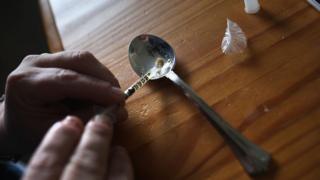Drug support services 'disappearing' due to government cuts, report says
 Image copyright
Getty Images
Image copyright
Getty Images
Drug treatment services are "disappearing" in some areas because of government funding cuts, a major report has concluded.
A "prolonged shortage of funding" has led to a loss of skills, expertise and capacity in support services, the report said.
Dame Carol Black, the report's author, said the illegal drugs market costs society more than £19bn a year.
The government said it was taking "tough action" to combat illegal drugs.
Dame Carol, who was commissioned by the Home Office to review drug supply and demand in the UK, said the funding shortage had contributed to a "perfect storm" which would "abate" only if the government took action.
She said other concerns included an increased supply of illegal drugs, greater purity and easier access to the substances.
The "widespread" use of children to supply drugswas the "most alarming" recent development, Dame Carol added.
Her report also found about three million people took drugs in England and Wales last year.
Dame Carol said: "Previous governments have de-prioritised these problems.
"I hope that the first phase of this review... will provide a firm platform for decisive action by the new government."
The report, which was released to coincide with a drugs summit held by the UK government in Glasgow, also said drug-related deaths are at an all-time high, while the market is becoming increasingly violent.
It found 300,000 people in England used the most harmful drugs - opiates and crack cocaine - last year.
According to the report, the illicit drugs market in the UK is worth £9.4bn a year but costs society more than double that figure.
'County lines' cost
The review said the "county lines" model is now a widely used method for supplying the most serious drugs.
County lines is a tactic which sees gangs and distribution networks from cities move into smaller towns and use violence to overtake local drug dealers.
The model relies on children or other vulnerable people to sell drugs.
Crime minister Kit Malthouse, who will chair the Glasgow summit later, said: "The findings, which we will discuss today, are troubling and paint a stark picture of how illegal drugs are devastating lives and communities, and fuelling serious violence.
"We are already taking tough action to combat county lines and violent crime and to disrupt and prosecute the organised gangs that bring so much misery. But clearly we all need to do more."